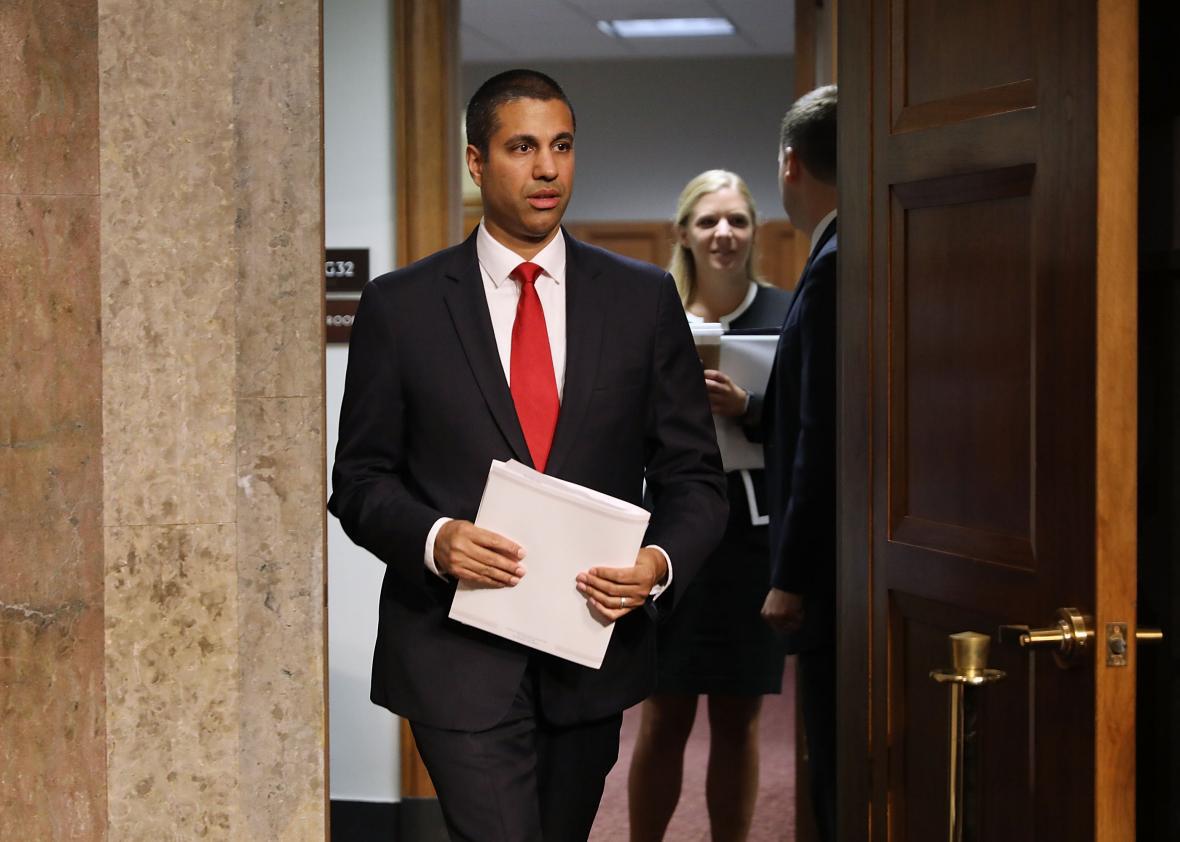
Chip Somodevilla/Getty Images
In an op-ed column in the New York Times on Thursday, Ajit Pai, the Trump-appointed chairman of the Federal Communications Commission, pitched a rather troubling proposal: that the FCC repeal its rule preventing a local broadcaster from also owning a daily newspaper, a radio station, in the same area. In Pai’s view, this is a common-sense thing to do given the punishing, rapidly changing economics of media these days. But he’s practically concern-trolling local media in order to advance a proposal that would chiefly grant more power to already powerful corporations.
Pai says he still wants to prevent a company from owning more than two TV stations in a given market, which an FCC rule essentially prohibits right now. But he argues in the Times that its sibling rule, which separates TV, newspaper, and radio ownership, has become archaic, even though it was similarly designed to prevent one company from having too much control over available media in a single market. Perhaps especially an ideologically motivated one on a buying spree, like, oh, Sinclair.
Imagine if a major American city had one owner controlling the newspaper, two popular TV stations, and a major radio station. For one thing, that might mean a single newsroom shared between the various properties, a move surely amounting to fewer journalists. And while it might give news consumers the illusion of variety—they may think that when they change the channel or pick up the local paper they’re getting diverse viewpoints—in actuality the owner would be one and the same. And ownership matters. To return to the example of Sinclair, which is currently gunning to buy Tribune Media (Sinclair owns 173 stations; Tribune owns 42), granting it access to more than 70 percent of American households, in March the owner of the network ordered its affiliates to double the amount of air time it gives to segments by its chief political analyst Boris Epshteyn, a former Donald Trump aide who slavishly parrots the administration’s line. (Disclosure: Slate’s owner, Graham Holdings, owns seven network-affiliate stations across the country.)
In his op-ed, Pai argues that lifting these ownership limits will help to revive local journalism, whose struggles are profound and hard to ignore. While, certainly, the occasional buyout of a local paper by a broadcaster could save a troubled publication, consolidation often leads to more layoffs and less local reporting. It could mean journalists are asked to write columns, produce television segments, and also be their own cameraperson. We’re already seeing a related trend in local TV. A 2014 report by Pew found that 1 in 4 local television broadcasters don’t produce their own local content at all. And sometimes, broadcasters in the same city have even entered into content-sharing agreements, resulting in sharing reporters, stories, and even, as with what happened Hawaii in 2014, one newscast that runs on two different stations simultaneously. That sure sounds like less local journalism to me.
Ownership really, really does matter. Since GOP megadonor Sheldon Adelson bought the Las Vegas Review-Journal, the newspaper has reportedly regularly killed or watered down stories that are critical of the casino and real estate tycoon’s dealings. Pai argues that it’s hypocritical that Google or Facebook are allowed to own a local newspaper, should they want to buy one (both companies, after all, go through great lengths to argue that they are not media companies), but a local broadcaster isn’t. Perhaps he’s right on that point, but the solution to that issue should be safeguards that ensure that when a major internet company tries to buy a local newspaper, the merger is properly scrutinized. It should not be relaxing the rules that prevent more consolidated power in the media.
American journalism has always had its dynastic owners, the Hearts and Pulitzers who presided over vast empires of publications. Sometimes these owners have been benevolent stewards of independent journalism, sometimes they haven’t. But there are rules in place to ensure that no matter who owns your local paper or station, you have several options for getting your news. Right now, getting the facts straight, and holding institutions both local and national accountable is harder and more important than ever. Consolidating ownership won’t put more reporters on the ground—but it will certainly amplify the influence of a small number of corporations. If Pai is going to argue for his industry-friendly consolidation proposals, he should at least stop pretending that this is about saving struggling newsrooms.
Pai says the FCC has a vote planned next Thursday to repeal the cross-ownership rule. The scary part is that with all the other terrible news breaking on any given day, this seemingly small change could happen without a stir.